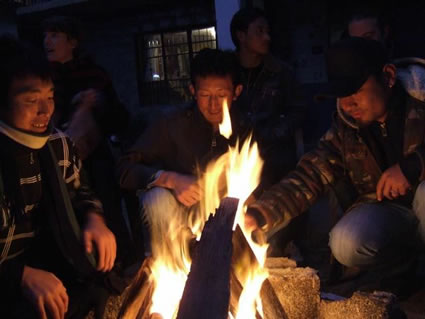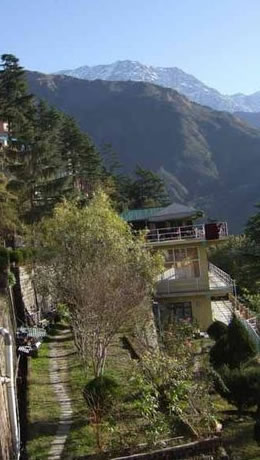Volunteer Work in Dharamsala, India with Tibetan Refugees
Article and photos by Ellen Besso
 |
| Bonfire at Tibet Hope Centre. |
Intention is the first step towards doing anything important in life. When one is clear about wanting to travel, volunteer, or work abroad, even if we cannot articulate why, our mind focuses around this idea, we begin to envision it happening, both consciously and unconsciously, and then we move to make it a priority.
My partner, Don and I arrived in India with no volunteer jobs in place, hoping to teach beginner level English and tutor Tibetan refugees in Dharamsala. After taking a Teaching ESL course in Vancouver I applied to the main volunteer clearing house in McLeod Ganj, Upper Dharamsala; they acknowledged receipt of my application, then made no other contact. The NGO’s (non-profit groups that provide social services) are short staffed, but I couldn’t help wondering if my application fell through the cracks because I did not request to be met at the airport, delivered to a hotel, then put on a bus to McLeod Ganj the next day, an option that provides income for the agency.
Things to remember as you embark on your volunteer work:
- Leaving one’s life behind is a mental, physical, and even spiritual transition that requires time.
- Even though we decided to "work without a net," previous experience in India gave us an advantage.
- Having accommodations arranged in advance is advisable in popular places.
Seeking NGO’s
Our search for volunteer opportunities takes us into McLeod Ganj; on the street we meet a young Swedish woman who asks us to sign a petition to reduce atmospheric carbon dioxide. She offers the names of several volunteer organizations, saying that she worked with the Tibetan Welfare office for a few days.
While looking for the NGO’s mentioned we notice others, but it is Saturday so they are all closed. A poster on a downtown wall announces an English-speaking group once a week at Lha, while a sign beside The Tibet Hope Center door says volunteers are in need to edit articles and collaborate with refugees for English tutoring. Next door is an association for former political prisoners; a teacher from our home community spent five months teaching ex-prisoners at a residential school in McLeod Ganj.
Staying at the Kirti Monastery
- Guesthouse rules may change; bookings of 6-12 months’ duration are now required for Kirti monastery rentals.
- One option is to book into a hotel, and then seek out a guesthouse of your choice after arrival.
We settle into accommodation at Kirti Monastery in the heart of McLeod Ganj. The monks’ lodgings take up much of the building with the guesthouse situated underneath, consisting of three levels of single rooms and several suites. The apartment is small and lovely, with a magnificent view of the mountains and Lower Dharamsala in the valley below.
By Western standards the apartment is rough, but affordable at an equivalent of 10 dollars a day. Electricity and hot water are available around the clock, except for occasional storm outages. We have access to nearby food supplies and a coffee shop.
 |
| View from Kirti Monastery. |
The Tibet Hope Center
Only three years old, The Tibet Hope Centre is very active and became an official NGO one year ago. THC volunteers work the streets regularly, handing out small flyers with the dual purpose of promoting cultural and political events, and seeking additional volunteers for conversation groups. A constant influx of assistants is needed; although a few of us stay for many weeks, most attend only once or twice, either passing through town or shopping around for a Center to work at.
This small NGO now serves 200 students, and 1,300 volunteers have passed through its doors since its inception in May of 2007. THC accomplishes a tremendous amount with few resources beyond the enthusiasm and passion of the people who run it and the work done by transient volunteers. Tasks appear to be accomplished with little co-ordination; this system gives volunteers autonomy to work on their projects.
The recent history of Tibet and Tibetans in exile is well documented, so we will leave those important details aside and discuss ways you can help the refugees in India who live in Dharamsala and its suburb, McLeod Ganj.
Dynamics of English Conversation Groups
- Try to approach your volunteer work without preconceived ideas. Things are different in India and classrooms and set curriculums may not be available.
- Curious questions go with the territory; be prepared to field them honestly.
Monday to Friday Western volunteers lead groups of refugee students in conversation groups in the front yard of the Center. Participation is on a day-by-day basis and group size varies each day depending on the ratio of Tibetans to volunteers. For one hour a topic is focused on, with subjects varying widely from Buddhism to politics, life and love, and the Tibetan New Year. We warm ourselves around a bonfire afterwards as one Tibetan from each group reports on their topic as part of their English training.
- Over a third of the participants are monks and males outnumber females.
- Many students are worldly and well travelled and often the conversational level is quite advanced.
- Although all levels are taught in classes, few beginner or low-intermediate students attend these groups
It does not take long before one finds oneself feeling more relaxed and competent in the role of group facilitator, enjoying the curious questions and upbeat energy of the young Tibetans.
Other Volunteer Opportunities
Jamyang Choling Nunnery is situated behind the Kirti Monastery monks’ residence. There are possible opportunities to tutor nuns or lay students living on site. After working with a few students, you will begin to grasp the basics of assessing English levels, but at first it can be tricky. Women are frequently shy, and their knowledge of English may exceed their verbal expression.
The Tibetan Women’s Association is on the third floor of an old building on Bhagsu Road. This large NGO is one of a select few recognized by the Tibetan Government in Exile. Their services help women deal with the issues that arise when adjusting to a new culture. Having little idea what to expect on arrival, the grief of leaving their family and previous life is massive, and many are traumatized because of their escape. To make a challenging situation worse, there is very little work available for refugees in McLeod Ganj.
TWA programs are related to women’s’ empowerment, whether it be reproductive rights of women living in Tibet, new arrivals studying English in Dharamsala, or learning a trade. The agency has an international presence.
At the nearby Tibetan Reception Centre, which is run by the Department of Security whose primary role is to ensure the security of His Holiness the Dalai Lama, I am directed upstairs. The director is away, so I am sent to a woman referred to by the honorific “Madam.” She gives me a brochure about the Centre but cannot answer any questions without a letter of authorization from the Central Office, a confidentiality issue. The woman does tell me that the Centre is quite full. There are no formal English classes held at TRC, so friendly English speaking volunteers are often welcomed by new arrivals.
Being Ready to Volunteer
- "When one helps others, dopamine is released" according to Dacher Keltner, author of Born to be Good. Volunteers working abroad experience many stages; while each person’s reaction is unique, there are commonalities.
- Debbie Leventhal, who studied volunteers working with street youth in Israel, identified the formal stages. Individuals become part of a greater purpose by on-the-job immersion. Through “reality shock,” as Levanthal terms it, volunteers make sense of their experience.
At one point I reached the "overwhelm" stage in my volunteering experience, that feeling of never being able to do enough. Others have mentioned that they feel the same; it is a common reaction when there is a great need, as with this population.
Kale Shoo — Tibetan for “farewell”
You will find that time passes quickly when you are engrossed in helping; our five weeks of volunteer work mixed with day trips and visits with friends certainly did. Although we do not feel our contribution has been that great, the folks at The Hope Center say that they are grateful for the work we have done. Our final bonfire with students and staff was a poignant farewell evening.
Ellen Besso is a coach and counsellor, specializing in women’s issues. Ellen has traveled and volunteered extensively throughout India. She worked for the Tibetan Women’s Association, facilitating an English and women’s empowerment program for new arrivals from Tibet. She and her partner Don are currently sponsors in the Canadian Tibetan Resettlement Program, which expects to bring 1000 displaced Tibetans to Canada over five years.
Ellen Besso writes about her experiences in An Indian Sojourn: One Woman’s Spiritual Experience of Travel & Volunteering. Besso’s first book, Surviving Eldercare: Where Their Needs End and Yours Begin chronicles her pilgrimage with her mother who had Alzheimer’s.
|
